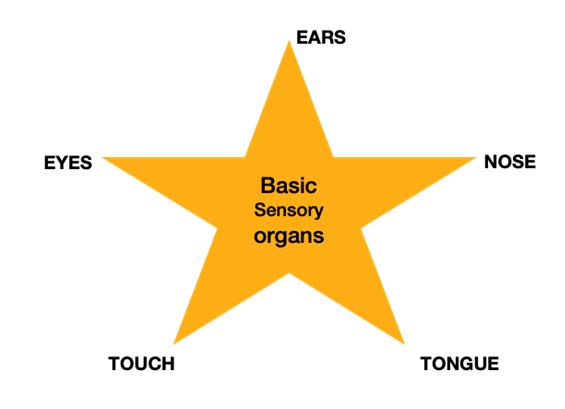Machine Learning is imitating the functions performed by sensory objects of a human by inducing artificial intelligence based on known things. Here we will go in detail and analyse what are the sensory objects defined for a human and how much are we aiming for making a machine to act human-like.

Empowering Humans with Senses and Knowledge
The Bhagavad Gita is an ancient Hindu epic, currently a famous quote by Robert J. Oppenheimer on the aftermath of creating the devastating atom bomb from the Bhagavad Gita translates as, “Now I become Death, the destroyer of worlds.”
This scripture has answers to all toughest questions of science, including the creation of universe and illusion of life. We cannot ignore the knowledge imparted in this epic which is beyond life.
Bhagavad Gita Ch13V 6-7
mahä-bhütäny ahaìkäro buddhir avyaktam eva ca I
indriyäëi daçaikaà ca païca cendriya-gocaräù II 6 II
icchä dveñaù sukhaà duùkhaà saìghätaç cetanä dhåtiù I
etat kñetraà samäsena sa-vikäram udähåtam II 7 II
The five great elements, false ego, intelligence, the unmanifested, the ten senses and the mind, the five sense objects, desire, hatred, happiness, distress, the aggregate, the life symptoms, and convictions—all these are considered, in summary, to be the field of activities and its interactions.
If we see, there are total twenty-four sensory objects for performing the human-like activities and actions. In academics, kids are always taught that there are five sense organs eyes, ears, nose, tongue and skin.

Activities Beyond Mechanical Sensors:
| Machine Sensors | Intelligence/Capability | Yet to Explore/Unknown |
| Ear | Male/Female Voice, Animal voice, thunder or storm, matching the content, listening different languages | It cannot distinguish if someone is modulating the voice, the tone in which it has been told because everyone has unique voice |
| Eyes | It can see and match the characteristics from the existing information or record | It cannot sense beauty and ugliness, only when the mind reacts because of some cause, we perceive |
| Nose | It can send the odour and tell which type from the stored information | Machine cannot decide which fragrance who will like, everyone has different liking |
| Touch | The feeling of hot, cold, warm, moisture, smooth or hard | Cannot feel the warmth in touch, the security in hugging, how much warmth, because the sensitivity varies among different humans |
| Tongue | Machine can taste based on the molecules and differentiate with the basic parameters on human taste data | Every human has thousands of food choices and its nearly impossible for a machine to find what a person will like, it is like a unique taste bud- no two persons have liking for the food varieties available on the planet |
| Speech | Machine can speak like a human, | Few people start crying while speaking when they talk about loved ones who left, few people just do not express the emotions in words |
The philosophy behind learning
To understand the concept of machine learning, we find the answers in Socrates dialogue Phaedo by Plato, on his last day of execution with
Simmias and Celebs, he told that learning is reminiscence and if anyone be reminded of anything he should have prior knowledge of the subject.
This is true when we speak about the human, in case of machines we need to train it with first time knowledge, after that it is all reminiscence learning the same way as defined by Socrates.
When we talk about reminiscence knowledge in philosophy it includes the visible and the invisible-like matter and spirit but in case of machine it’s all about matter. The artificial intelligence applied to machines is with respect to matters and will always lag cognitive intelligence.
When a child is born, no one teaches laughing or crying, its known to the new-born. You would notice babies smiling in dreams, the feeling of happiness and pain is known when he opened his eyes to the world. If you show a cute teddy to a baby, it will smile but when you show some horror figure the baby gets scared. The knowledge of these senses has come with him before the birth. I still remember when my son was two months old and I used to hold him after tying my hair, he used to cry uncontrollably until I loosened my hair. What was in his memory which made him act in this way, is a question and till date he never like that I tie my hair.
Types of Knowledge and significance for Machine Learning Applications
When Aristotle defined the knowledge in three parts, he would have not done that classification based on some technological simulation. Can any machine learning device define such an eternal concept of knowledge, how much artificial intelligence we infused in it ? The theory of knowledge of Aristotle is based upon physical world in contrast to Plato who says in his Theory of Forms that the perfect form exists only in the virtual world. Aristotle classified the human knowledge into three forms. These were episteme (scientific knowledge), techne (skill and crafts) and phronesis (wisdom or prudence). He believed that scientific knowledge is theoretical and rest of the two are practical.
The first stage for machine learning is putting our scientific knowledge into the machine based on theoretical knowledge. Like mapping our basic sensory organs with the mechanical sensors.
The second stage is to make this machine skilled to do the work perfectly like techno of Aristotle, by practical knowledge and experience.
The third stage phronesis (wisdom and prudence) is the toughest to achieve because human behaviour is unpredictable with infinite possibilities.
When the third stage gets achieved it might be a danger to human-kind when the whole civilisation might get wiped because the control will go to the machines. The way we feel the danger from wild animals and kill them in self-defence, in the same way the machine can also see us as an enemy and harm in return. It might become the Destroyer of the universe!
Neural net pioneer Geoffrey Hinton is sounding the alarm on AI. He said generative intelligence could spread misinformation and, eventually, threaten humanity. He would have seen it coming in lab and raised an alarm. As per philosophical theory from Socrates two opposite always exist like death and life, cold and hot, good, and bad. This evolution will also bring bad with it along with good things. No one can deny the fact and avoid it. Everyone shows ignorance towards the threat because the attraction towards the innovation which eases our life is always attractive. For our greed and selfishness, we ignore the other bad side.
The GenZ is very innovative and excited about the new revolution in this area, what is needed is to educate them to see the things with human perspective. By learning from our ancient knowledge, they should evolve their wisdom not only in scientific area but also spiritual.
Creating human-like scientific advancements takes centuries but these advancements can wipe the whole of the humanity and civilisation with a blink of eye. There might be non-ending wars from technologically self-reliant and powerful countries which slowly can lead to destruction, because when everyone uses power it only brings catastrophe.














